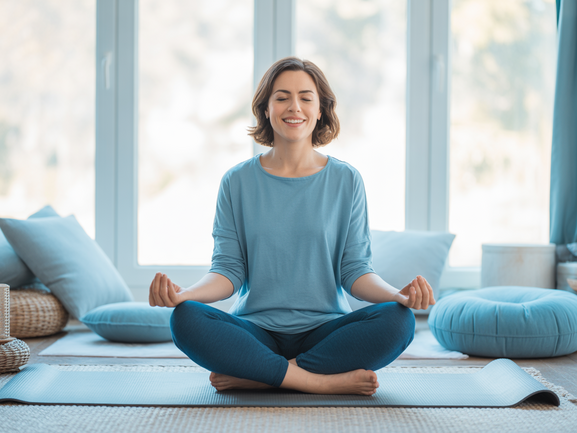Yoga Philosophy for Beginners: Simple Spiritual Practices for Modern Life
Picture this: you’re sitting at your desk for the eighth hour today, feeling disconnected from your body and overwhelmed by endless notifications. Despite being constantly “connected,” something feels missing. If this resonates with you, you’re not alone – and yoga philosophy might hold the key to rediscovering balance in your modern life.
When most people hear “yoga,” they immediately envision complex pretzel-like poses or mystical practices reserved for the spiritually advanced. However, yoga philosophy for beginners is actually much simpler and more accessible than you might think. At its core, yoga is a complete life philosophy designed to create harmony between mind, body, and spirit – perfect for our fast-paced, sedentary world.
What is Yoga Philosophy Really About?
Contrary to popular belief, you don’t need to abandon your current beliefs or become incredibly flexible to embrace yoga spirituality basics. Yoga philosophy is essentially a practical guide for living a more balanced, mindful life. Think of it as a toolkit for managing stress, improving focus, and finding peace amidst chaos.
The word “yoga” itself means “union” – the connection between your conscious mind and your deeper self. For sedentary individuals dealing with stress, anxiety, or feeling stuck in routines, this ancient wisdom offers surprisingly modern solutions.
The Eight Limbs of Yoga: Simplified for Beginners
The foundation of yoga philosophy rests on eight principles, known as the “eight limbs.” Don’t worry – these aren’t complicated spiritual concepts. Instead, they’re practical guidelines that can transform your daily experience:
1. Yamas (Ethical Guidelines)
These are simply about treating others and yourself with kindness. For beginners, focus on ahimsa (non-violence), which includes being gentle with yourself as you start your wellness journey.
2. Niyamas (Personal Observances)
Think of these as healthy habits. Saucha (cleanliness) can be as simple as organizing your workspace, while santosha (contentment) involves appreciating what you have right now.
3. Asanas (Physical Postures)
Yes, these are the yoga poses you’ve seen, but for beginners, even gentle stretching at your desk counts. The goal is maintaining a healthy, comfortable body.
4. Pranayama (Breath Control)
This is where meditation benefits become immediately apparent. Simple breathing exercises can be done anywhere – even during your lunch break.
5-8. The Final Four Limbs
These involve concentration, meditation, and deeper spiritual practices that naturally develop as you progress. No pressure to master these immediately!
How Yoga Philosophy Supports Mental Health
Research consistently shows the powerful connection between yoga and mental health. For sedentary individuals, yoga philosophy offers several key benefits:
- Stress Reduction: Regular breathing practices activate your parasympathetic nervous system, naturally reducing cortisol levels
- Improved Focus: Mindfulness techniques help combat the scattered feeling that comes from constant digital stimulation
- Better Sleep: Evening meditation practices can significantly improve sleep quality
- Emotional Regulation: Yoga philosophy teaches you to observe emotions without being overwhelmed by them
The beauty of these practices is that they work regardless of your physical fitness level or spiritual background.
Simple Ways to Start Your Spiritual Practice at Home
Wondering how to start yoga spiritual practice at home? Here are five accessible ways to incorporate yoga philosophy into your sedentary lifestyle:
1. Morning Intention Setting (5 minutes)
Before checking your phone, take five minutes to set a positive intention for your day. This simple practice helps align your actions with your values.
2. Mindful Breathing Breaks
Set a timer to remind yourself to take three conscious breaths every hour. This helps break the cycle of stress and tension that builds during long work sessions.
3. Evening Gratitude Practice
End each day by identifying three things you’re grateful for. This cultivates santosha (contentment) and shifts your focus from what’s lacking to what’s abundant.
4. Gentle Movement Meditation
You don’t need perfect poses. Simple stretches combined with mindful breathing can be profoundly healing for both body and mind.
5. Digital Detox Periods
Practice pratyahara (withdrawal from sensory distractions) by setting specific times when you disconnect from devices and reconnect with yourself.
Breaking Common Misconceptions
Let’s address some frequent concerns about beginner yoga practice:
“I’m not religious – is yoga for me?” Absolutely! Yoga philosophy is about personal growth and well-being, not religious doctrine. Many practitioners maintain their existing beliefs while benefiting from yoga’s practical wisdom.
“I’m too stiff and out of shape.” Perfect! Yoga meets you where you are. The spiritual aspects actually matter more than physical flexibility – your willingness to grow is all that’s required.
“I don’t have time for lengthy spiritual practices.” Even five minutes of mindful breathing can make a significant difference. Consistency matters more than duration.
The Science Behind Spiritual Practice
Modern research validates what yoga practitioners have known for centuries. Studies show that regular meditation and mindfulness practices literally reshape your brain, improving areas responsible for emotional regulation, attention, and stress management.
Furthermore, the meditation benefits extend beyond mental health. Regular practice can lower blood pressure, improve immune function, and even slow cellular aging. For sedentary individuals, these practices offer a powerful counterbalance to the physical effects of prolonged sitting.
“Yoga philosophy isn’t about perfection – it’s about progress and self-compassion.”
Building Your Practice with Vitalizen
Starting a spiritual practice can feel overwhelming, but you don’t have to navigate this journey alone. Vitalizen.app offers beginner-friendly guided sessions that make ancient wisdom accessible for modern lives.
Whether you have five minutes or fifty, our platform provides structured guidance that grows with you. From basic breathing techniques to deeper philosophical explorations, you’ll find practices suited to your current lifestyle and aspirations.
The convenience of practicing at home removes common barriers – no need to worry about being “good enough” for a studio class or finding time to commute. You can explore yoga spirituality basics in the comfort of your own space, at your own pace.
Frequently Asked Questions
Do I need to be religious to practice yoga philosophy?
Not at all! Yoga philosophy is a practical system for improving your quality of life, regardless of your religious background. Many practitioners find it complements

